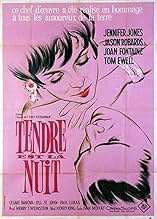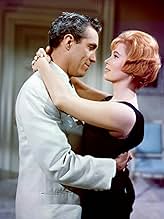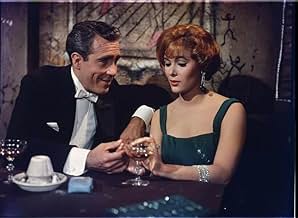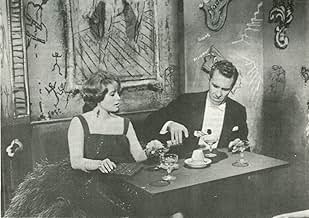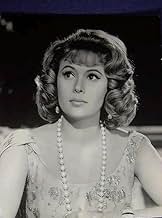अपनी भाषा में प्लॉट जोड़ेंA Psychiatrist and his life with a patient he helped to recover.A Psychiatrist and his life with a patient he helped to recover.A Psychiatrist and his life with a patient he helped to recover.
- 1 ऑस्कर के लिए नामांकित
- 1 जीत और कुल 1 नामांकन
Jason Robards
- Dr. Richard 'Dick' Diver
- (as Jason Robards Jr.)
फ़ीचर्ड समीक्षाएं
When this was released I managed to see most films first-run, except the ones clearly aimed at my age group. (Such a snob, n'est-ce pas?!?) So, being a fan of both Jennifer and Joan, I went to a Los Angeles-area theater with top-notch projection and sound. Back then Twentieth-Century Fox rarely stinted on sending companies to the actual locales of the stories being filmed, so this one has plenty of its share of gorgeous shots set in Switzerland and elsewhere on the Continent, as I recall.
But, as other comments herein attest, the rest is somewhat of a disappointment. Henry King, the director, seemed to encourage Jennifer Jones in some of her less-attractive mannerisms which somehow were not so apt as a rendition of her character's mental distress. Jason Robards, Jr. was never much of a success as a romantic lead, in my opinion. And Joan Fontaine was assigned the rather thankless role of a rich "bitch." All in all it's a prime example of how the studio "system" was growing out of touch with an ever-younger movie audience. Nevertheless for those of us who have always appreciated luxurious eye candy, it was a fairly tasty treat.
But, as other comments herein attest, the rest is somewhat of a disappointment. Henry King, the director, seemed to encourage Jennifer Jones in some of her less-attractive mannerisms which somehow were not so apt as a rendition of her character's mental distress. Jason Robards, Jr. was never much of a success as a romantic lead, in my opinion. And Joan Fontaine was assigned the rather thankless role of a rich "bitch." All in all it's a prime example of how the studio "system" was growing out of touch with an ever-younger movie audience. Nevertheless for those of us who have always appreciated luxurious eye candy, it was a fairly tasty treat.
Other comments cover every aspect except: The semi-autobiographical nature of Francis Scott Key Fitzgerald's novel, "Tender Is The Night". It is the story of his love for Zelda Sayre. Putting himself in the role of a psychiatrist who makes the fatal mistake of falling in love with a patient. F. Scott Fitzgerald from Minneapolis, MN, transforms his real life experiences into fiction beautifully in the Fitzgeraldian style. Zelda Sayre Fitzgerald spent time at Shepard-Pratt Hospital and at Eudowood Sanitarium. Fitzgerald and Zelda became hypnotized by the lifestyle provided by the money from Scott's work. When the money ran out he went back to work until his luck ran out. I enjoyed seeing "Tender Is The Night" several times and would enjoying seeing this film again.
Well, c'est la vie.
A wonderful cast and beautiful scenery are the highlights of "Tender is the Night," a 1962 film starring Jason Robards, Jennifer Jones, Tom Ewell, Joan Fonaine, Jill St. John, and Paul Lukas. The film is based on a book by F. Scott Fitzgerald.
Fitzgerald wrote beautiful prose, but much of his work has been difficult to adapt to the screen. He himself worked as a writer in Hollywood but wound up uncredited on most of the scripts and told someone that he did recognize one of his lines in a film that evidently had not been cut from a script.
In this film, Robards plays Dick Driver, a psychiatrist who falls for one of his patients, Nicole (Jones). Nicole is being treated for mental instability, the result of incest (though this is only hinted at). When Dick realizes his feelings, and hers, he quickly distances himself, but she runs into him after she leaves the sanitarium and the two wind up getting married.
Nicole is filthy rich, and the money is controlled by her sister (Joan Fontaine). Dick gets lulled into the good life, the parties, the travel, the luxury, and while he intends to return to his work at the sanitarium and finish a book, he doesn't go. This is mainly because the insecure and sometimes paranoid Nicole is resistant. When he finally returns to the sanitarium, his mentor (Lukas) is dying and the sanitarium has been taken over by a colleague, who only wants Driver's investment. Driver refuses, since he would have to get the money from Nicole, but she insists. But for Driver, it feels like it's all too late.
The acting is superb and Jones, one of my favorites, looks gorgeous throughout. She is somewhat nervous and mannered as Nicole, but that's the character, and she captures her. Robards is strong, emotional, and excellent as the deeply convicted Driver. And how wonderful to see Paul Lukas. I actually recognized his voice and then looked at his face -- I'm so used to seeing him in movies made 20 years earlier that I didn't recognize him at first.
The problem with the film for me is that so much that goes on is beneath the surface -- this can be a fascinating feature, but it is directed at too leisurely a pace by Henry King. The St. John character is never really fleshed out, she darts in and out of the picture; ditto the drunken composer played by Tom Ewell. We just don't know enough about him to care. Joan Fontaine wears some great clothes and acts well, and we do get to know her somewhat.
The other problem is the time in which it is set, which seems a bit generic. It's supposed to be the '20s - I can tell by the music - but not by anything else. The ambiance is '60s.
Nevertheless, Tender is the Night was an ambitious project that probably could have used some judicious editing, but if you're a Jones fan you won't want to miss it.
A wonderful cast and beautiful scenery are the highlights of "Tender is the Night," a 1962 film starring Jason Robards, Jennifer Jones, Tom Ewell, Joan Fonaine, Jill St. John, and Paul Lukas. The film is based on a book by F. Scott Fitzgerald.
Fitzgerald wrote beautiful prose, but much of his work has been difficult to adapt to the screen. He himself worked as a writer in Hollywood but wound up uncredited on most of the scripts and told someone that he did recognize one of his lines in a film that evidently had not been cut from a script.
In this film, Robards plays Dick Driver, a psychiatrist who falls for one of his patients, Nicole (Jones). Nicole is being treated for mental instability, the result of incest (though this is only hinted at). When Dick realizes his feelings, and hers, he quickly distances himself, but she runs into him after she leaves the sanitarium and the two wind up getting married.
Nicole is filthy rich, and the money is controlled by her sister (Joan Fontaine). Dick gets lulled into the good life, the parties, the travel, the luxury, and while he intends to return to his work at the sanitarium and finish a book, he doesn't go. This is mainly because the insecure and sometimes paranoid Nicole is resistant. When he finally returns to the sanitarium, his mentor (Lukas) is dying and the sanitarium has been taken over by a colleague, who only wants Driver's investment. Driver refuses, since he would have to get the money from Nicole, but she insists. But for Driver, it feels like it's all too late.
The acting is superb and Jones, one of my favorites, looks gorgeous throughout. She is somewhat nervous and mannered as Nicole, but that's the character, and she captures her. Robards is strong, emotional, and excellent as the deeply convicted Driver. And how wonderful to see Paul Lukas. I actually recognized his voice and then looked at his face -- I'm so used to seeing him in movies made 20 years earlier that I didn't recognize him at first.
The problem with the film for me is that so much that goes on is beneath the surface -- this can be a fascinating feature, but it is directed at too leisurely a pace by Henry King. The St. John character is never really fleshed out, she darts in and out of the picture; ditto the drunken composer played by Tom Ewell. We just don't know enough about him to care. Joan Fontaine wears some great clothes and acts well, and we do get to know her somewhat.
The other problem is the time in which it is set, which seems a bit generic. It's supposed to be the '20s - I can tell by the music - but not by anything else. The ambiance is '60s.
Nevertheless, Tender is the Night was an ambitious project that probably could have used some judicious editing, but if you're a Jones fan you won't want to miss it.
'Tender is the Night' remains one of F. Scott Fitzgerald's most important works, but, sadly, he, today, is not recognized as one of America's truly formidable writers. Film representations have not always worked, but his characterizations are etched superbly when given to the right performer e.g. Alan Ladd's extraordinary depiction in 'The Great Gatsby'. The film of 'Tender is the Night' had been criticized for all the wrong reasons, one of them, perhaps, relating to the fact that some critics continued to misinterpret the work of Jennifer Jones, surely as fine an actress of the era as is Meryl Streep today. Perhaps Selznick did limit her access to some of the best scripts offered, but, here, in 'Tender', she is still so absolutely right in every movement and shading of Nicole's character. Jason Robards, a brilliant actor, may not have been perfectly cast, but Joan Fontaine, in the latter part of her career, expertly captures the selfish, ego-involved woman of the era. Jill St. John and Tom Ewell are only adequate, but, in total, the film works because of the expert script, the cinematography, the music, King's direction, and the ever-important work of Fontaine and Jones. Both of these women essayed numerous kinds of roles in their careers. Here, Jennifer Jones is still in top form, and the film deserves to be reevaluated.
"Tender is the Night" seemed to be the sort of film Jennifer Jones should not have been making at that time in her career. She was a woman who had emotional problems that seemed uncomfortably close to the problems her character in the film experienced.
The film is based on what is considered F. Scott Fitzgerald's most autobiographical novel. According to some sources, Jennifer Jones' character, Nicole Diver, was based on Fitzgerald's marriage to a highly-strung woman who suffered from severe psychological disorders.
Like Hemingway's "The Sun Also Rises", the film is set among expatriate Americans in Europe in the 1920's. Nicole (Jennifer Jones) is married to psychiatrist Dick Diver (Jason Robards). They are financially well off and their life revolves around serious partying. They even have a resident, alcoholic, piano playing composer, Abe North, played by Tom Ewell, who is frustrated at having a great melody stuck in his system.
We learn through flashback that Nicole had been Dick's patient and there is concern that she may not really be cured and that Dick himself may have issues. Infidelity lurks in every corner, especially when a young starlet takes a fancy to Dick. Eventually Nicole and Dick drift apart as Dick heads deeper into alcoholism (as did Fitzgerald).
Jennifer Jones still exuded that amazing aura and fits the part well; too well if one is aware of her story.
Cary Grant was considered for the part of Dick Diver, but it finally went to Jason Robards. Although he was a brilliant stage and character actor, Robards didn't project the charisma of a Cary Grant, and maybe that's what was needed.
Although the final scenes do pack a punch, for the most part the film seems dry and talky.
There is location work in Switzerland and France with brilliant scenes at the end shot on the French Riviera, but much of the interior studio work is flat and uninspired. Also, Bernard Herrmann's score doesn't marry with the fabric of the film the way his scores did for "Vertigo", "North By Northwest" and many others.
The actors are photographed mainly at the middle distance with few close-ups. Possibly Selznick forbade closing in on Jennifer Jones who was about 43 at the time. She looked fabulous though with a tightly bobbed hairstyle.
Big and glossy, the film is interesting more for the behind-the-scenes story, but for Jennifer Jones fans, she is still a good reason to seek it out.
The film is based on what is considered F. Scott Fitzgerald's most autobiographical novel. According to some sources, Jennifer Jones' character, Nicole Diver, was based on Fitzgerald's marriage to a highly-strung woman who suffered from severe psychological disorders.
Like Hemingway's "The Sun Also Rises", the film is set among expatriate Americans in Europe in the 1920's. Nicole (Jennifer Jones) is married to psychiatrist Dick Diver (Jason Robards). They are financially well off and their life revolves around serious partying. They even have a resident, alcoholic, piano playing composer, Abe North, played by Tom Ewell, who is frustrated at having a great melody stuck in his system.
We learn through flashback that Nicole had been Dick's patient and there is concern that she may not really be cured and that Dick himself may have issues. Infidelity lurks in every corner, especially when a young starlet takes a fancy to Dick. Eventually Nicole and Dick drift apart as Dick heads deeper into alcoholism (as did Fitzgerald).
Jennifer Jones still exuded that amazing aura and fits the part well; too well if one is aware of her story.
Cary Grant was considered for the part of Dick Diver, but it finally went to Jason Robards. Although he was a brilliant stage and character actor, Robards didn't project the charisma of a Cary Grant, and maybe that's what was needed.
Although the final scenes do pack a punch, for the most part the film seems dry and talky.
There is location work in Switzerland and France with brilliant scenes at the end shot on the French Riviera, but much of the interior studio work is flat and uninspired. Also, Bernard Herrmann's score doesn't marry with the fabric of the film the way his scores did for "Vertigo", "North By Northwest" and many others.
The actors are photographed mainly at the middle distance with few close-ups. Possibly Selznick forbade closing in on Jennifer Jones who was about 43 at the time. She looked fabulous though with a tightly bobbed hairstyle.
Big and glossy, the film is interesting more for the behind-the-scenes story, but for Jennifer Jones fans, she is still a good reason to seek it out.
क्या आपको पता है
- ट्रिवियाThe Divers are based on real-life couple Gerald and Sara Murphy, friends and patrons of the famous, including the author of this story, F. Scott Fitzgerald. Poet Archibald Macleish once said of the Murphys that "there was a shine to life wherever they were".
- गूफ़The American flag adorning the child's sand castle has its stars arranged in the staggered rows of 5 and 6 stars as in the current 50 stars arrangement. An American flag of the 1920's would have had its stars in the 6 rows of 8 arrangement.
- भाव
Mr. Albert Charles McKisco: What's your place in the economy of life, Barban?
Tommy Barban: I shoot
Mr. Albert Charles McKisco: Just any old thing, huh?
Tommy Barban: Well, er... buffalo in Africa, tigers in India, Bolsheviks in Europe...
Mr. Albert Charles McKisco: Don't you ever get the urge to do anything?
Tommy Barban: Yes. I would like to restore the Holy Roman Empire.
- कनेक्शनFeatured in 20th Century-Fox: The First 50 Years (1997)
- साउंडट्रैकTender Is the Night
Music by Sammy Fain
Lyrics by Paul Francis Webster
Sung by an off-screen vocal group during the opening credits
टॉप पसंद
रेटिंग देने के लिए साइन-इन करें और वैयक्तिकृत सुझावों के लिए वॉचलिस्ट करें
- How long is Tender Is the Night?Alexa द्वारा संचालित
विवरण
बॉक्स ऑफ़िस
- बजट
- $39,00,000(अनुमानित)
- चलने की अवधि2 घंटे 22 मिनट
- रंग
- पक्ष अनुपात
- 2.35 : 1
इस पेज में योगदान दें
किसी बदलाव का सुझाव दें या अनुपलब्ध कॉन्टेंट जोड़ें




